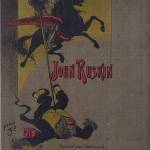Reprising from my interview with economist David Henderson:
I asked him how economics came to be called the “dismal science.” The source, he explained, was Thomas Carlyle, the nineteenth-century historian and essayist. The surprising reason for his coining the phrase? Carlyle was attacking free-market liberals for advocating the end of slavery.

Free-market liberals argued that all men were equally deserving of freedom, so the slaves should be emancipated. Carlyle counter-argued — with strong agreement from Charles Dickens and John Ruskin, two other strong critics of free-market capitalism — that blacks were unequal to whites and so undeserving and incapable of freedom. Giving slaves freedom, they believed, would lead to dismal social consequences.
Here is a fine essay by David Levy and Sandra Peart with the sorry details: “The Secret History of the Dismal Science. Part I. Economics, Religion and Race in the 19th Century.”
The image, as Levy and Peart explain, shows Ruskin as a white knight slaying a black man dressed in gentlemen’s finery and holding a book entitled Wealth of Nations, Adam Smith’s treatise being a major work in the free-market capitalist tradition.

Side note 1: Carlyle was a major influence, if not the major influence, on the thought of George Fitzhugh, the nineteenth-century American advocate of slavery. Fitzhugh argued that negroes are inferior to whites and that capitalism leads to the dominance of the weak by the strong; hence the freedom of capitalism would be detrimental to the negroes, as they would not be able to hold their own and compete; consequently, slavery’s security is a protection and blessing for them. See especially Fitzhugh’s Cannibals All! Or, Slaves without Masters.

Side note 2: Carlyle was a strong student of German philosophy and literature, particularly of the Kantian disciple Johann Gottlieb Fichte, about whom I have written here.
Related: Who gets the blame for slavery and the the credit for ending much of it?
This is one of those “secrets” that’s never really been secret at all–Carlyle’s quote isn’t obscure, and scholarly articles concerning it and the debate that supplies its context go back, I think, to the ’60s. Admittedly many who have heard the phrase “dismal science” have assumed it to have a rather different meaning. But that’s only because they never bothered to check.
In revealing the supposed “secret,” on the other hand, I hope the David Henderson and David Levy and others won’t inadvertently perpetuate a different but equally unfortunate misconception, namely, one that would be warranted in dismissing Carlyle as a mere racist and economic dunderhead, instead of recognizing in him one of the most original (if also one of the most cranky and reactionary) voices of 19th century British literature.
Agreed that it’s not a secret among scholars, George, though interestingly there’s a wide gap between them and the general public’s believe. I googled “meaning of dismal science” and the first four entries returned got it wrong:
http://www.knowledgerush.com/kr/encyclopedia/Dismal_Science/
http://www.thestudentroom.co.uk/showthread.php?t=1532971
http://groups.yahoo.com/group/conflictransition/message/1088
http://www.guardian.co.uk/commentisfree/2008/nov/11/credit-crunch-economics